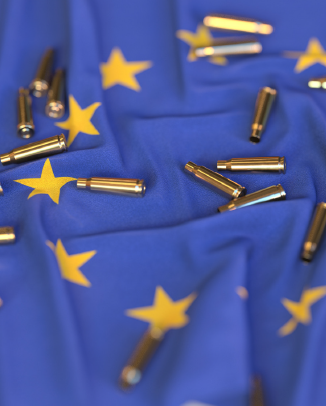[FR] European defence, NATO, Ukraine: a few points to clarify

Russia’s invasion of Ukraine has triggered a cascade of violent shocks within the EU: the end of the illusion that trade is a factor in universal peace; the realisation that geopolitics is not an outdated concept from the last century but a vital requirement in which states are on the front line; upheaval of all structural rules, whether it be the suspension of the stability pact or the extraordinary acceleration of enlargement processes, etc. In short, another world is emerging, in which another EU must be quickly rethought.
Amid this global upheaval in the EU, the most optimistic observers want to believe that the spectacular rearmament decided by all Member States since 24 February 2022 bodes well for the future of the EU’s common defence policy. Pessimists, on the other hand, are alarmed by Germany’s new rearmament policy, which they see as contradicting Berlin’s previous commitments to European defence. What exactly is the situation?
We are living in an Atlantic moment in Europe: the war in Ukraine confirms more than ever that NATO, and therefore the United States, are the major players in Europe’s defence: all member states are rearming within NATO; Sweden and Finland want to join the Atlantic Alliance as soon as possible. And they are right. At a time of Putin’s madness, it is difficult to see what could reassure and defend, if necessary, the Baltic states, Poland or Romania. We may regret or applaud this Atlantic consecration, but in any case it is the only strategic reality of the moment.
Does this mean that we should abandon all strategic plans for the EU? Certainly not, but we must not get the timing wrong. Today, consolidating NATO is a strategic necessity. But tomorrow, it is possible that the engine of European defence will be restarted by the American protector itself. Two scenarios must be considered: a victory for Trumpists in 2024, who would give up on investing more in European security; or another major crisis, particularly with China, which would lead the American administration to choose the Asian front over the European front. Who else but Europe could then act in favour of European defence?
As for Germany, whose rearmament is indeed spectacular, did it have any choice but to buy American? Could it have bought Rafales, when American deterrence can only be embodied by missiles carried by F-35s? To criticise its choices is either ignorant or disingenuous. Could it have risked consolidating its anti-missile defence without resorting to American systems? The fact that the American arms industry is the main beneficiary of European rearmament is as regrettable as it is inevitable. However, in order to reinforce the EU’s strategic ambitions for the future, would it not be better to propose coordination between the French military programming law and the defence document that Germany is currently drafting? Would it not be better to develop a Franco-German, and then European, military strategy with regard to the war in Ukraine, rather than moving forward in the vagueness of US defence policy?




